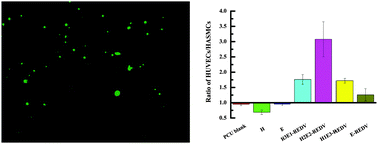Antimicrobial surfaces grafted random copolymers with REDV peptide beneficial for endothelialization†
Abstract
Polycarbonate urethane (PCU) elastomeric materials have been developed for vascular prosthesis applications, because of their excellent mechanical and physical properties. However, thrombosis and inflammation often limit their usage as small-diameter vascular grafts. Herein, we focused on the design and functionalization of a PCU elastomer with enhanced hemocompatibility, rapid endothelialization and antimicrobial properties. An atom transfer radical polymerization (ATRP) technique was utilized to graft random copolymers of N-(2-hydroxypropyl)methacrylamide (HPMA) and eugenyl methacrylate (EgMA) onto a PCU surface, and subsequently the cysteine-terminated CREDV peptide sequence was directly linked onto the surface by a thiol–ene click reaction to prepare a series of REDV peptide functionalized surfaces. The chemical compositions of the modified surfaces were quantified by X-ray photoelectron spectroscopy (XPS), and the hydrophilicity was evaluated by water contact analysis and water uptake. The surface hemocompatibility was verified by platelet adhesion assays, and the results demonstrated that platelet adhesion was significantly reduced on the modified surface. More importantly, the functionalized surfaces with high hydrophilicity and cell specific adhesive REDV peptide could selectively enhance the adhesion and proliferation of human umbilical vein endothelial cells (HUVECs) but they suppressed these behaviors in human arterial smooth muscle cells (HASMCs). Moreover, these surfaces showed excellent antibacterial properties, which originate from the EgMA moieties of the copolymers. The successful fabrication of multifunctional surfaces with excellent hemocompatibility, rapid endothelialization, and good antimicrobial activity through a feasible route could be an attractive platform for tissue engineering applications.


 Please wait while we load your content...
Please wait while we load your content...